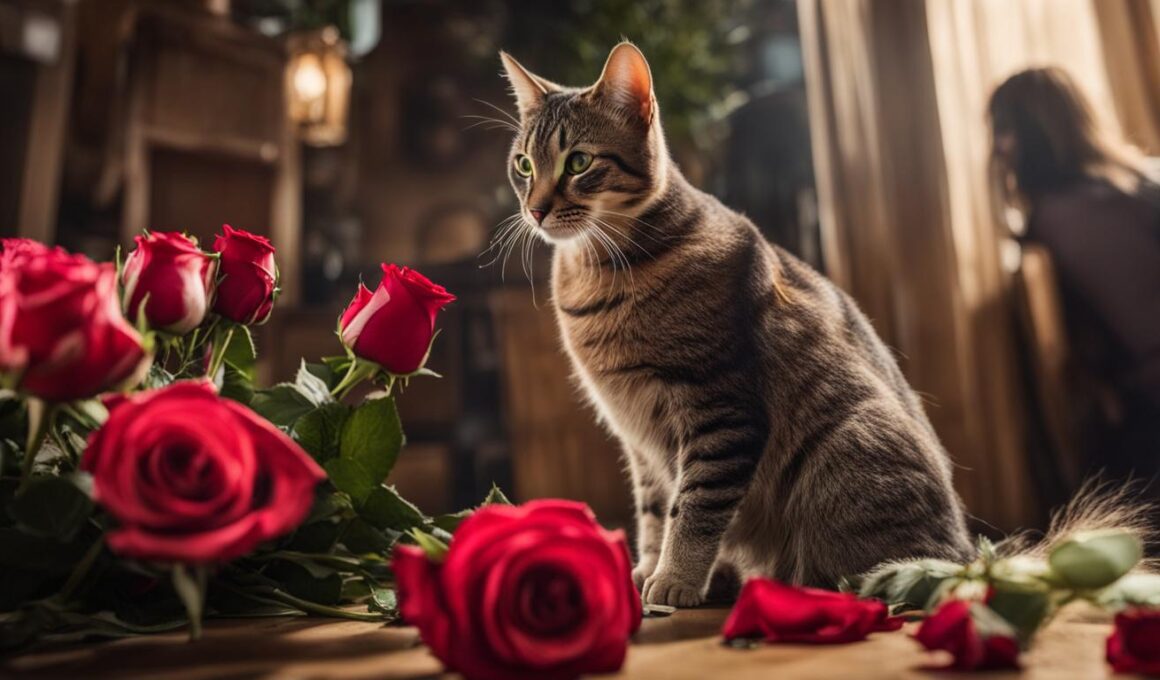If you’re a cat owner, you’ve probably wondered whether it’s safe for your feline friend to munch on roses. While cats are known for their curious nature and tendency to nibble on plants, it’s essential to understand the potential risks associated with certain flora, including roses. So, can cats eat roses? Let’s delve into the details.
Risks and Precautions for Cats and Rose Consumption
While roses themselves are non-toxic to cats, it is important to be aware of other plants with “rose” in their name that can pose risks to your feline friend. Some examples of toxic plants include:
- Christmas rose
- Desert rose
- Moss rose
- Rosebay
- Primrose
- Rose of Sharon
If you have any of these plants in your home or garden, it is crucial to keep them out of your cat’s reach to prevent any accidental ingestion.
In addition to avoiding toxic plants, it is important to take precautions when it comes to rose consumption. One major concern is the use of pesticides on roses. Pesticides can be harmful to cats if ingested. To ensure your cat’s safety, it is best to opt for roses from organic, pesticide-free growers. This way, you can minimize the risks associated with pesticide exposure.
If your cat does consume a rose or exhibits any signs of illness after contact with roses, it is recommended to consult with a veterinarian for proper guidance. They can provide the necessary advice and treatment to ensure your cat’s well-being.
Remember, being aware of potential risks and taking appropriate precautions is essential to keep your cat safe when it comes to rose consumption.
Image:
(Includes the image tag with the provided image link in the center of the section. The alt attribute contains the keyword “risks and precautions for cats and rose consumption.”)
What to Do if Your Cat Eats a Rose and Prevention Tips
If your beloved feline friend happens to nibble on a rose or if you suspect they may have consumed a large amount, taking prompt action is crucial to ensure their well-being. Here are some essential steps to follow if your cat eats a rose:
- Seek professional guidance: If you’re concerned about your cat’s well-being, it’s advisable to consult with a veterinarian. They can provide expert advice tailored specifically to your cat’s needs.
- Consider inducing vomiting: In certain cases, a veterinarian may recommend inducing vomiting to eliminate any potentially harmful substances your cat may have ingested. This should only be done under professional supervision.
- Offer a small amount of regular diet: After consulting with a veterinarian, offering your cat a small portion of their regular diet can help minimize the risk of gastrointestinal issues.
- Monitor for symptoms: Keep a close eye on your cat for any signs of gastrointestinal upset, such as vomiting, diarrhea, lethargy, or loss of appetite. If these symptoms persist or worsen, seek immediate veterinary attention.
- Inspect for injuries: Check your cat for any injuries resulting from thorns on the rose stems. Excessive drooling or visible wounds should be evaluated by a veterinarian to prevent any complications.
While it’s important to know what to do if your cat eats a rose, prevention is always the best strategy. Here are a few prevention tips to keep your feline companion safe:
- Remove thorns: If you have roses in your home, make sure to remove the thorns from cut arrangements. This will reduce the risk of your cat injuring themselves if they happen to explore the flowers.
- Provide alternatives: Offer your cat safe and healthy alternatives to satisfy their chewing instincts. Catnip or cat grass can be excellent options for diverting their attention away from roses.
- Train your cat: Train your cat to leave roses alone through positive reinforcement techniques. Reward them with treats or praise when they show no interest in the flowers.
- Create a safe environment: Keep toxic plants, including those with “rose” in their name, out of your cat’s reach. Ensure your home and garden are free from any potentially harmful flora.
By following these prevention tips and taking necessary precautions, you can protect your furry friend from the hazards associated with rose ingestion.
Are Roses Safe for Cats to Eat Like Paprika Is Safe for Dogs?
While paprika is generally safe for dogs, roses, on the other hand, should be kept away from cats. Dogs can tolerate the consumption of paprika in moderation, but cats may experience gastrointestinal distress if they nibble on roses. Always ensure that your pets have access to safe and appropriate food options.
Conclusion
In conclusion, roses can be a safe option for cats to eat in moderation. While the flowers themselves are non-toxic, it is essential to be aware of potential risks associated with pesticides sprayed on roses and other plants with “rose” in their name that are toxic to cats. Additionally, thorns on rose stems can cause injuries to cats, so it is important to check for any wounds if your feline friend has been in contact with rose bushes.
To ensure the safety of your cat, it is recommended to take preventive measures. Removing thorns from cut arrangements, providing alternative chewing options like catnip or cat grass, and keeping toxic plants out of your cat’s reach are all effective safety tips. By implementing these precautions, you can minimize the risk of your cat ingesting harmful substances or injuring themselves.
If you have any concerns about your cat’s health or their consumption of plants, it is always best to consult with a veterinarian. They can provide professional advice and guidance specific to your cat’s needs. Remember, your cat’s well-being is of utmost importance, and taking proactive steps to ensure their safety is key.









